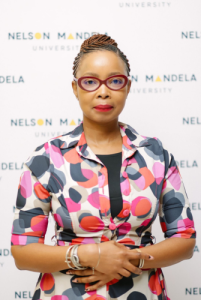Zeitz MOCAA invites you to Speaking in Tongues, a critical gathering on the occasion of the Seekers, Seers, Soothsayers exhibition and book launch. This one-day discursive programme will include performances and presentations by exhibiting artists, writers, thinkers. The programme will include the launch of the Seekers, Seers, Soothsayers exhibition publication. It includes texts by thought provoking essays by French Beninese filmmaker, curator and researcher Farah Clémentine Dramani-Issaifou, Zimbabwean-born award-winning writer, scholar, and cultural historian Panashe Chigumadzi, as well as essays from the curators of the exhibition Tandazani Dhlakama and Beata America.
The title of this gathering is derived from Jamaican author, Kei Miller’s poem titled Speaking in Tongues (2007). The poem encapsulates issues of spirituality, Black maternal lineages, language, and place, which is why it was apt to include it in the introductory rooms of the Seekers, Seers, Soothsayers exhibition space. It begins with the narrator reflecting on spirituality and his African diasporic maternal lineage. Miller’s poem prompts us to consider ideas around gathering, ritual, heritage, the metaphysical and one’s own sense of rootedness.
To expound on this, for this gathering, we cite another Miller text titled, The Last Warner Women (2010). This text further highlights connected intergenerational histories, narrating stories of migration, nostalgia, and spirituality. In this fictional narrative, one of the main protagonists has a prophetic gift which is later misunderstood as madness when she leaves her home country. This prompts us to think about language, performance, and transmission of knowledge alongside acts of decolonizing.
Using the themes explored in Miller’s text to reflect on the Seekers, Seers, Soothsayers exhibition, Zeitz MOCAA invites you to join us in this discursive invocation, alongside writers and academics Ruth Simbao, Pumla Gqola, Bulelwa Kunene, and exhibiting artists Gladys Kalichini, Latedjou, Sekai Machache, Pamina Sebastião, Buhlebezwe Siwani, and contributing author Panashe Chigumadzi.
SEEKERS, SEERS, SOOTHSAYERS PUBLICATION
Launched on the occasion of the Seekers, Seers, Soothsayers exhibition, the publication offers critical reflections on the work of seven artists, Gladys Kalichini, Latedjou, Sekai Machache, Nyancho NwaNri, Pamina Sebastião, Buhlebezwe Siwani and Helena Uambembe. Their lens-based practices explore accounts and experiences connected to metaphysical or intangible realms. Included in the publication are thought provoking essays by French Beninese filmmaker, curator and researcher Farah Clémentine Dramani-Issaifou, Zimbabwean-born award-winning writer, scholar, and cultural historian Panashe Chigumadzi, as well as essays from the curators of the exhibition Tandazani Dhlakama and Beata America. The texts speak to the power of filmmaking as a decolonial strategy for the restitution of African film heritage, and the multiplicity of senses steeped within African cosmologies, that allows further understanding of the physical and spiritual world. The publication is designed by Untitled (Yvon Langué and Soukaina Aboulaoula).
Zeitz MOCAA’s curatorial and exhibition programming is generously supported by Gucci, Mellon Foundation, and BMW Group South Africa.
Event Details
Date: Saturday, 6 July 2024
Time: 10 am – 6 pm
Venue: Zeitz MOCAA Level 6 and Atrium Bowl
Cost: The critical gathering + book launch is free with museum entry of R250 pp or with a valid Zeitz MOCAA membership (from R290 pp).
Book: Registration is required. Kindly click the link below to book your seat.
Meet the Speaking in Tongues Participants
Panashe Chigumadzi

Panashe Chigumadzi is an award-winning writer, scholar, and cultural historian writing across gender, geography and generation in her exploration of themes ranging from race, religion and spirituality, to African philosophy and cosmology, Black Consciousness, Black Feminism, Black Internationalism and Pan-Africanism, to the afterlives of settler colonialism, transatlantic slavery, global (anti-)Blackness, and the indignity of Black life under crippling poverty and violence. Chigumadzi is the author of These Bones Will Rise Again (2018), a historical memoir reflecting on Robert Mugabe’s military ouster through the spirits of anti-colonial heroine Mbuya Nehanda and her grandmother Mbuya Chigumadzi, which was shortlisted for the 2019 Alan Paton Prize for Non-fiction. Her 2015 debut novel Sweet Medicine won the 2016 K. Sello Duiker Literary Award. Chigumadzi was the founding editor of Vanguard Magazine, a platform for black women coming of age in post-apartheid South Africa. A columnist for The New York Times, and contributing editor of the Johannesburg Review of Books, her work has also featured in periodical publications including The Guardian, The Washington Post, Boston Review, The Los Angeles Review of Books, Die Zeit, Chimurenga, The Sunday Times, City Press, Africa is A Country, and Transition. As a member of the African Feminist Initiative, she has contributed essays to landmark Afro-feminist anthologies such as Margaret Busby’s New Daughters of Africa: International Anthology of Writing by Women of African Descent (2019) and Gabeba Baderoon and Desiree Lewis’s award-winning Surfacing: On Being Black and Feminist in South Africa (2021).
Chigumadzi has a doctorate from Harvard University’s Departments of African and African American Studies and History, and holds a master’s degree in African Literature from the University of the Witwatersrand.
Pumla Dineo Gqola
Professor Gqola is Professor of Literary and Cultural Studies and the NMU-DSI-NRF SARChI Chair in African Feminist Imagination. She has previously been Professor of African Literature at the University of the Witwatersrand, Senior Lecturer in the Department of English and Classical Culture at the University of the Free State, and Chief Research Specialist in the Societies, Culture and Identities Research Programme of the Human Sciences Research Council. A graduate of the Universities of Cape Town and Warwick, UK, she also holds a DPhil in Postcolonial Studies from the University of Munich (LMU) in Germany.
Prof Gqola was appointed to the DHET Ministerial Task Team on sexual harassment and gender-based violence in South African public universities and sits on the Board of Trustees of the African Feminist strategic litigation firm, Women’s Legal Centre. She was inaugural Chair of Judges of the Etisalat Literature Prize, the first fully funded and run Pan African literary award, and inaugural Chair of Judges for the National Institute for Humanities and Social Sciences (NIHSS) Fiction panel.
Gqola is the author of the ground-breaking study on slave memory in South Africa, What is slavery to me? Postcolonial/Slave memory in post-apartheid South Africa (Wits University Press, 2010) and the landmark Rape: A South African Nightmare (MF Books/Jacana, 2015) which won the 2016 Sunday Times Alan Paton Award for Non Fiction. Her other books are A Renegade Called Simphiwe (MF Books/Jacana, 2013) and Reflecting Rogue: Inside the Mind of a Feminist (MF Books/Jacana, 2017). Most recently, she released Miriam Tlali: Writing Freedom with HSRC Press, an introductory text on the pioneering Black South African feminist novelist, short story writer and essayist Miriam Masoli Tlali, and Female Fear Factory with MF Books (in Southern Africa).
She has guest edited journal special issues of Agenda and Feminist Africa and Scrutiny2 on sexuality and body image, South African women’s poetry, and subaltern sexualities, as well as a special issue of SABLE LitMag on South African Literature. Her academic journals and peer-reviewed book chapters have been on slave memory, Black Consciousness literature, African and postcolonial feminisms, African and Caribbean writers, South African visual and musical artists, and post-apartheid public culture.
Ruth Simbao
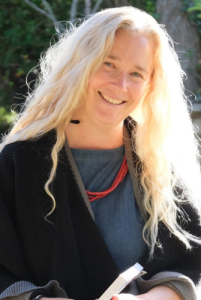
Ruth Simbao is a Professor in the Fine Art Department at Rhodes University, South Africa, and teaches Art History and Visual Culture. Her research interests include contemporary art with a particular focus on Africa, the geopolitics of art and society, geopolitics in relation to biennialisation, ‘strategic southernness’ and the Global South, theories of ‘place’, contra-flow diasporas, cosmopolitanism and cosmolocalism, redefinitions of ‘the local’, the power of small spaces and modest gestures, artists’ responses to xenophobia, China-Africa relations and the arts, contemporary cultural festivals and globalisation, performance theory and live art, the performance of heritage in Zambia, and site-situational art.
Simbao received her PhD from Harvard University’s Department of History of Art and Architecture in 2008, and was an American Council of Learned Societies (ACLS) postdoctoral fellow as part of the Humanities in Africa programme in 2010. In 2002 she received a Harvard University Teaching Award as a Teaching Fellow, and was the recipient of the Vice-Chancellor’s Distinguished Research Award at Rhodes University in 2009.
She has received a number of research and travel grants from the Andrew Mellon Foundation, the Getty Foundation, the Marion and Jasper Whiting Foundation, the College Art Association, the American Social Science Research Council, the Jennifer Oppenheimer Foundation, Norton, the Canada Council of the Arts, Harvard University (History of Art and Architecture, African and African-American Studies, Film Studies and the Graduate Student Council), the National Research Foundation (South Africa), the National Lottery Distribution Trust Fund, the National Arts Council, Rhodes University, and the Eastern Cape Provincial Arts and Culture Council.
In recent years Simbao founded the following research initiatives, projects and networks: Visual and Performing Arts of Africa (ViPAA) (2011 to present), Residencies for Artists and Writers (RAW) (2014 to present), and Art & Culture: Writers in Africa (ACWA) (2015).
She has published in various journals including African Arts, Art South Africa, NKA: Journal of Contemporary African Art, JACANA: Journal of African Culture and New Approaches, Third Text, Kronos: Southern African Histories, Parachute, Mix, Lola, De Arte, Image & Text, Social Dynamics and the International Journal of African Historical Studies.
Recent curatorial projects include SLIP: Mbali Khoza and Igshaan Adams, the performance art programme BLIND SPOT at the National Arts Festival, and Making Way: Contemporary Art from South Africa and China at the Standard Bank Gallery in Johannesburg.
Gladys Kalichini
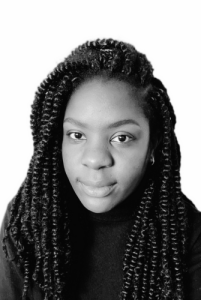
Gladys Kalichini is a researcher and artist whose work draws from concepts of memory and representations of history and is centred on reconnoitring complexities in connection to visibilities and representations of women within larger, dominant and nationalist histories.
Kalichini holds a PhD in Art History from Rhodes University where she also received her MFA in 2017, culminating in the solo exhibition ChaMoneka: UnCasting Shadows. She is a member of the National Research Foundation’s South African Research Chair Initiative (SARChI) programme in Geopolitics and the Arts of Africa and the Global South Research Group. Kalichini has participated in the Àsìkò International Art Programme as part of the Centre for Contemporary Art Lagos (CCA Lagos) in Maputo, Mozambique in 2015, the Fountainhead Residency in Miami, USA in 2017, and the second iteration of the “Women On Aeroplanes” project in Lagos, Nigeria in 2018. In 2019/2020 she was artist-in-residence with KfW Stiftung, where she developed the exhibition … these gestures of memory. In 2021 she received a Seed Award from the Prince Claus Fund, and in 2022 she won the Henrike Grohs Art Award from the Goethe Foundation. She has recently participated in the exhibitions #Empowerment at the Kunstmuseum in Wolfsburg, Germany, Bamako Encounters—African Biennale of Photography (2022) in Bamako, Mali; Geographies of Imagination: My Language is a Bedouin Thief, Kochi Biennale, India (2022); and For the Phoenix to Find Its Form in Us. On Restitution, Rehabilitation and Reparation (2021) at Savvy Contemporary in Berlin, Germany.
Buhlebezwe Siwani
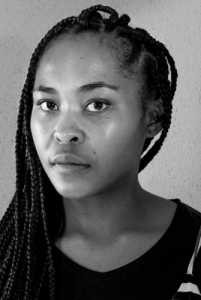
Buhlebezwe Siwani is an artist and sangoma currently based in Amsterdam and Cape Town and raised between Gauteng, KwaZulu Natal and the Eastern Cape. In her practice, she considers the embodied and spiritual experiences of Black women in South Africa and predominantly works in performance, video, and installation.
Siwani holds a BAFA (Hons) from the Wits School of Art in Johannesburg (2011). She earned her MFA from the Michaelis School of Fine Arts in 2015 where she co-founded iQhiya, a collective of Black women artists. In 2021 Siwani won the Standard Bank Young Artist Award for Art, celebrated with the exhibition of iYeza at Standard Bank Gallery, Johannesburg in 2023.
She has presented multiple solo exhibitions internationally, including Amanzi angena endlini, Madragoa, Lisbon (2022); Impilo Inegama, No Man’s Art Gallery, Amsterdam (2022); and Dedisa ubumnyama, Cairns Art Gallery, Cairns (2021). She has participated in numerous biennials including the 14th Gwangju Biennial, South Korea (2023); Toronto Biennial, Arsenal Contemporary, Canada (2022); Casablanca Biennial, Morocco (2021); Bamako Encounters, Mali (2019); and Anozero – Bienal de Arte Contemporânea de Coimbra, Portugal (2017). Recent group shows include A Clearing in the Forest, TATE Modern, London (2022); Rethinking Nature, Museo Madre, Napoli (2021); The Power of My Hands, Paris Museum of Modern Art, Paris (2021); Goddesses of Healing, M.Bassy, Hamburg (2021); and Witness: Afro Perspectives from the Jorge M. Perez Collection, Miami (2020).
Latedjou
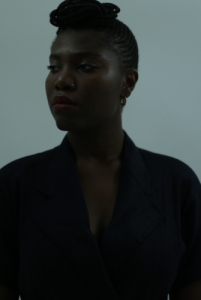
Latedjou is an Angolan-Beninese vocalist, multi-instrumentalist, critic, polyglot, and visual artist, currently based in Luanda. Her practice partly reflects on the personal, political, and generational tensions around language in postcolonial Africa. She is also devoted to exploring self-inquiry as a pathway to collective regeneration and liberation, and believes sound to be a powerful conduit through which this can occur.
She holds an MA in Critical and Creative Analysis from Goldsmiths University. She has written and directed three short films, Ndozi Blues (2018), Dikenga (2021) and Domingo é Dia de Descanso (2021). She independently released her first EP, O Baile dos Sentidos, in 2017, followed by Língua Livre in 2019. The first single of the album, Zola-Na-Luz-Água, was debuted as a short film directed by the artist. In 2022, Latedjou was one of the international residents of the Pocoapoco Residency Programme held in Oaxaca, Mexico. In 2019, Latedjou was artist-in-residence at Villa Waldberta, in Munich, Germany. In 2018 and later, in 2021, she participated in the fifth and seventh editions of Fuckin’ Globo, a periodic exhibition of Angolan artists in Luanda. Latedjou has performed in Luanda, Paris, and Berlin, including Silent Green, where she held a live concert as part of Savvy Contemporary’s Invocations series (2019).
Sekai Machache
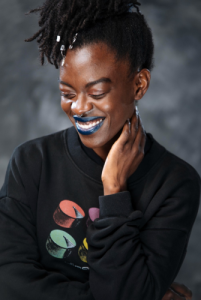
Sekai Machache is an international artist and curator based in Glasgow, Scotland. Sekai’s work is a deep interrogation of the notion of self, in which photography, performance, and film play crucial roles in supporting an exploration of the historical and cultural imaginary. Investigating the relationship between spirituality, dreaming, and the artist’s role in disseminating symbolic imagery, Sekai provides a space for healing against contexts of colonialism and loss.
Machache has a BFA (Hons) and an MFA from the Duncan of Jordanstone College of Art and Design at the University of Dundee. In 2020 she received the Morton Award from the Royal Scottish Academy and held a residency at the Talbot Rice Gallery at the University of Edinburgh. She has presented two solo exhibitions: Divination, Sakhile&Me, Frankfurt (2022) and Projects 20, Stills Gallery, Edinburgh Arts Festival (2021), and participated in numerous group exhibitions. In 2016, Machache was a founding member of Yon Afro Collective, a cohort of women artists of colour in Scotland. In 2024, Sekai Machache will be among the artists representing Zimbabwe at the Venice Biennale.
Pamina Sebastião
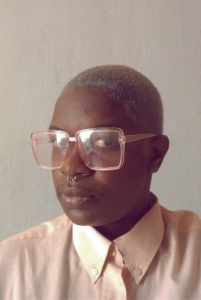
Pamina Sebastião is an artivist based in Luanda. Through photography, video, and collage, they focus on creating a cultural artistic archive of death, decolonization and new imagination of a queer body in Angola.
Sebastião holds a Law degree from Catholic University, Luanda and a Master’s degree in International Law with a focus on African Human Rights System from Lisbon University (2015). In 2022, they presented the solo exhibition Master of My Universe? at Jahmek Contemporary Art, Luanda; participated in the 7th edition of the Lubumbashi Biennial; and received a Seed Award from the Prince Claus Fund. They have presented in numerous group exhibitions including Exposure There Is No Cure, MOVART, Luanda; Queer to the Bank, Galleria Fonti, Naples; In Dependência, Ondjango Feminista, Luanda (2021); and Sem Sombras (Unshadowed), apexart, Maputo (2023). Sebastião regularly delivers lectures and talks in public, academic, and activist spaces. They co-founded the Angolan Identity Archive, an LBTQI+ feminist collective, and also co-created Rompe artistic collective and centre in Angola. They have been shortlisted for the Henrike Grohs Art Award 2024 from the Goethe Foundation.
Bulelwa Kunene
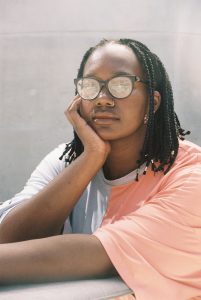
Bulelwa Kunene is a researcher and arts practitioner from Eswatini, currently based in Cape Town, South Africa. In 2022, she was part of the MTN Bushfire Festival team as a Head of Department for the Bring Your Fire Zone, and worked as part of Yebo! Art Gallery’s team on a various exhibitions and EU funded projects. She was also part of the initial start-up team for the Vuka Project Space in Malkerns, Eswatini, which seeks to uplift and promote local sculptural practices, permaculture and youth communities. In 2023, she joined the Zeitz MOCAA & UWC Museum Fellowship Program and as a museum fellow had the opportunity to complete a research essay at Honours level as part of UWC’s Department of Historical Studies. She is currently undergoing her Master’s studies at UWC and working as part of Zeitz MOCAA’s team as a research assistant for the African Art Resource Centre.
Meet the Seekers, Seers, Soothsayers Authors
Panashe Chigumadzi

Panashe Chigumadzi is an award-winning writer, scholar, and cultural historian writing across gender, geography and generation in her exploration of themes ranging from race, religion and spirituality, to African philosophy and cosmology, Black Consciousness, Black Feminism, Black Internationalism and Pan-Africanism, to the afterlives of settler colonialism, transatlantic slavery, global (anti-)Blackness, and the indignity of Black life under crippling poverty and violence. Chigumadzi is the author of These Bones Will Rise Again (2018), a historical memoir reflecting on Robert Mugabe’s military ouster through the spirits of anti-colonial heroine Mbuya Nehanda and her grandmother Mbuya Chigumadzi, which was shortlisted for the 2019 Alan Paton Prize for Non-fiction. Her 2015 debut novel Sweet Medicine won the 2016 K. Sello Duiker Literary Award. Chigumadzi was the founding editor of Vanguard Magazine, a platform for black women coming of age in post-apartheid South Africa. A columnist for The New York Times, and contributing editor of the Johannesburg Review of Books, her work has also featured in periodical publications including The Guardian, The Washington Post, Boston Review, The Los Angeles Review of Books, Die Zeit, Chimurenga, The Sunday Times, City Press, Africa is A Country, and Transition. As a member of the African Feminist Initiative, she has contributed essays to landmark Afro-feminist anthologies such as Margaret Busby’s New Daughters of Africa: International Anthology of Writing by Women of African Descent (2019) and Gabeba Baderoon and Desiree Lewis’s award-winning Surfacing: On Being Black and Feminist in South Africa (2021).
Chigumadzi has a doctorate from Harvard University’s Departments of African and African American Studies and History, and holds a master’s degree in African Literature from the University of the Witwatersrand.
Farah Clémentine Dramani-Issifou
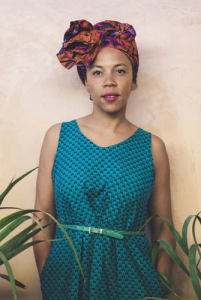
French and Beninese Farah Clémentine Dramani-Issifou is a film programmer, curator, and researcher. She lives and works between Paris, Dakar and Cambridge.
Since 2011, she has been a film programmer for international film festivals such as the Festival des Nouveaux Cinémas Documentaires between Paris and Cotonou (2011-2017), the Semaine de la Critique (2018-2021), and the slide section of the Cannes Film Festival, before becoming artistic coordinator of the Cannes Short Film Committee (2021-2022), the Villa Médicis Film Festival (2022), the Marrakech International Film Festival (2022-) and the Fespaco (2022-). Since 2020, she has been the deputy director of the Yennenga Centre in Dakar.
Farah Clémentine Dramani-Issifou is also curator of the exhibitions Un.e Air.e de Famille, the Headquarters (HQ) and Women Focus of the Africa2020 Season (Saint-Denis, France 2021), Tofodji: sur les pas de nos ancêtres (Porto-Novo, Benin, 2022) and Afrotropes, des imaginaires en mouvement (Dakar, Senegal, 2024). She´s been developing the curatorial based research project Restitute African Film Archives since 2023 with the support of the Yennenga Centre, the Harvard Film Study Center and the Villa Albertine.
As a scholar, her work focuses on decolonial curatorial practices in the visual arts and cinema. In 2023, she was named Knight of Merit, Arts, Letters, and Communication of Burkina Faso. In 2024, she is a resident at Villa Albertine in Boston and a fellow at Harvard Film Study Center.
Tandazani Dhlakama

Zimbabwe born, Tandazani Dhlakama has worked as a curator and art educator at Zeitz MOCAA since 2017. She was previously at the National Gallery of Zimbabwe and contributed to exhibitions, conferences, and biennials in Africa in a variety of functions. Dhlakama holds a master’s degree in art gallery and museum studies from the University of Leeds, UK (2015), and a bachelor’s degree in fine art and political science from St. Lawrence University, Canton, N.Y., U.S. (2011). Amongst several projects she co-curated When We See Us: A Century of Black Figuration in Painting (2022), curated a survey exhibition of painting from Zimbabwe titled Five Bhobh: Painting at the End of an Era (2018) at Zeitz MOCAA, curated Witness: Afro Perspectives from the Jorge M. Pérez Collection (2020) at El Espacio 23 in Miami, and recently co-curated Seekers, Seers, Soothsayers (2023), an exhibition celebrating the next generation of women artists working in lens-based media from Africa at Zeitz MOCAA.
Tandazani’s writing appears in the artist monographs of Georgina Maxim, Akinbode Akinbiyi, and Wallen Mapondera, in publications such as Audacious Art Practices: Situating the Contemporary Arts of Africa; Plasticity of the Planet: On Environmental Challenge for Art and Its Institutions; as well as in MOMA’s Post: Notes on Art In A Global Context; TSA Collector’s Series: Artists & Cities, Africanah: Arena for Contemporary African, African American and Caribbean Art, and ArtLife magazine, to name a few. Tandazani serves as a member of the NESR Foundation Artistic Committee in Luanda, as well as the ARAK Foundation Advisory Committee in Doha.
Beata America
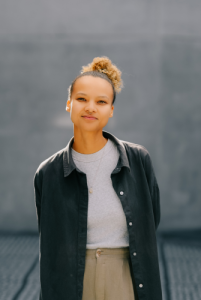
Beata America is an assistant curator at Zeitz Museum of Contemporary Art Africa. She holds a diploma in classical music, from Stellenbosch University (2015) and a BA humanities degree from Stellenbosch University (2018), as well as an honours degree in curatorship through the Centre for Curating the Archive, at the University of Cape Town’s Michaelis School of Fine Art (2019).
During her time at Zeitz MOCAA, she has assisted and done research for the following exhibitions: Only Sun in the Sky Knows How I Feel – (A Lucid Dream) (2021); Soft Vxnxs (2022); Shooting Down Babylon (2022); Indigo Waves and Other Stories: Re-Navigating the Afrasian Sea and Notions of Diaspora (2022); When We See Us: A Century of Black Figuration in Painting (2022); Past Disquiet (2023); Seismography of Struggle: Towards a Global History of Critical and Cultural Journals (2023); and Seekers, Seers, Soothsayers (2023). America has also assisted and contributed to publications that have accompanied these exhibitions, as well with the Atelier residency of Igshaan Adams titled Not Working (Working Title) (2022).
In 2020, she co-founded the art wine collective Processus with partner Megan van der Merwe, a curator and winemaker collaboration which explores wine as an ephemeral art object and the artistic processes therein.

